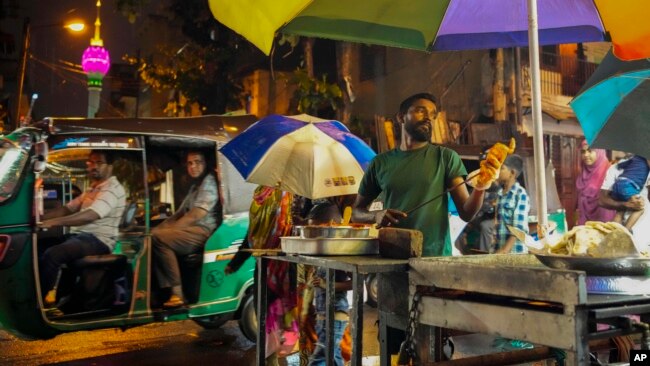南アジアの飲食店のサバイバルは”地産地消”
“What is important is to learn to live with what we have in our hands.”
まさしくその通りですね!!
今後このようなウィルスは出てきますし、それでなくても温暖化に続き、世界的に人口増加から食料は取り合いになります。
このまま円安が続き、買い負けし、自給率が低いことから我が国はどうするのでしょうか? ずいぶん以前からわかっていたことなのでは?
VOAで英語を学びましょう♬
- 南アジアの飲食店がパンデミック被害から回復するために’地元産を’(和訳)
- South Asian Eateries 'Go Local’ to Recover from Pandemic Losses
南アジアの飲食店がパンデミック被害から回復するために’地元産を’(和訳)
South Asian Eateries 'Go Local’ to Recover from Pandemic Losses
Jan.09,2023
南アジアのホテルやレストランは、COVID-19の大流行により、外食のあり方を見直す必要に迫られています。世界的な健康危機により、多くの飲食店が閉店を余儀なくされました。生き残った店は、より地元産の食材を使おうとしています。
インドでは、レストランが閉鎖され、ウイルスの発生により大きな被害を受けました。何百万人ものレストラン関係者が職を失いました。
隣国のスリランカでも、外食産業関係者は苦闘を続けています。
サマン ナヤナンダさんは、スリランカの首都コロンボにあるホテルの飲食担当者です。彼は地元の食材をもっと活用することが重要だと言います。
ナヤナンダさんは、23万人の死者を出した2004年の大津波を生き延びました。2009年に終結した長い内戦を生き抜き、イースター休暇に起きた2019年の致命的なテロ攻撃の結果を目の当たりにしました。
どの災害の後でも、スリランカの経済は回復することができました。
しかし今回は、回復のための苦労が大きくなっています。同国の経済は、負債と燃料・食料不足に直面しています。
「COVIDの1年後、すべてのホテルが食料の配送を開始しました。」とかあれはい言っています。「我々は徐々に回復していたのに、この経済危機が来てしまった。」と。
「この危機は、中産階級を崩壊させました。」 と彼は言っています。
このような状況なので、ナヤナンダさんらは地元の食材を中心に献立を考えました。地元産のサツマイモ、キャッサバ、ヤムイモ、ササゲを使った料理が作られました。
マニーシュ・バヘティ さんは、South Asian Association for Gastronomyの創設者兼ディレクターです。彼は、パンデミックによって、健康への懸念や食材の調達に関する意識が高まったと述べています。このため、業界はより環境に優しい方法を採用するようになりました。その中には、地元で採れた食材を使った料理を提供することも含まれています。
「季節に応じて地元の新鮮な野菜を食べること、ナッツ類や豆類、緑の葉野菜を多く含む食事に戻すことは、今後も続く傾向です」とバヘティさんは述べています。
外食産業が再建される中、レストラン経営者は、パンデミックが前進の道を示すあいだ、いくつかの慣習が必要となったと述べています。
多くの都市部では、植物由来の食生活を試したり、敷地内で野菜や果物を工夫して育てたりしています。
コロンボに戻ったナヤナンダさんは、家族を養うのが難しくなったため、自転車で通勤し、自宅で食物を栽培するようになりました。
スリランカをはじめとするアジア諸国では、最近、中国でCOVID-19の感染が相次ぎ、再び操業停止などの規制がかかるのではないかと心配されています。しかし、ナヤナンダさんは希望を抱いていると言います。
「大切なことは、今あるもので生きていくことを学ぶことです」と彼は言っています。
South Asian Eateries 'Go Local’ to Recover from Pandemic Losses
Hotels and restaurants across South Asia have had to reimagine eating out because of the COVID-19 pandemic. The worldwide health crisis forced many eateries to close. Those that survived are trying to use more local sources.
In India, restaurants were badly harmed by lockdowns and virus outbreaks. Millions of people in the industry lost their jobs.
In neighboring Sri Lanka, those in the restaurant industry continue to struggle.
Saman Nayanananda is a food and drink supervisor at a hotel in the Sri Lankan capital Colombo. He said that depending more on local food sources is critical.
Nayanananda survived a powerful tsunami in 2004 that killed 230,000. He lived through a long civil war that ended in 2009 and witnessed the results of the deadly 2019 terrorist attack that happened on the Easter holiday.
After every disaster, Sri Lanka's economy was able to recover.
But this time, the struggle to recover is greater. The country's economy is faced with debt and fuel and food shortages.
“A year after COVID, all hotels started food delivery," he said. "We were slowly recovering and then this economic crisis came.”
“This crisis,” he said, “it has broken the middle class.”
Because of the struggles, Nayanananda and others have centered on local foods to develop their offerings. Dishes were created that used locally grown sweet potatoes, cassava, yams and cowpeas.
Maneesh Baheti is founder and director of the South Asian Association for Gastronomy. He said the pandemic has raised awareness about health concerns and food sourcing. This has led the industry to adopt more environmentally friendly practices. That includes offering dishes made with locally grown produce.
“Eating fresh local produce according to season, returning to diets rich in nuts, legumes and green leafy vegetables, are trends that are here to stay,” Baheti said.
As the food services industry rebuilds itself, restaurant owners say some practices that became necessary during the pandemic can offer a way forward.
Many urban communities are experimenting with plant-based diets and growing vegetables and fruits in creative ways on their properties.
Back in Colombo, Nayanananda began riding a bicycle to work and growing food at his home after it became difficult to feed his family.
In Sri Lanka and other countries in Asia, the recent wave of COVID-19 infections in China has caused worries over the risk of a return to shutdowns and other restrictions. But Nayanananda said he is hopeful.
“What is important," he said, "is to learn to live with what we have in our hands.”
Words in This Story
outbreak - n. a sudden start or increase of fighting or disease
dish - n. food that is prepared in a particular way
awareness - n. the state of knowing that something (such as a situation, condition, or problem) exists
diet - n. the food that a person or animal usually eats
